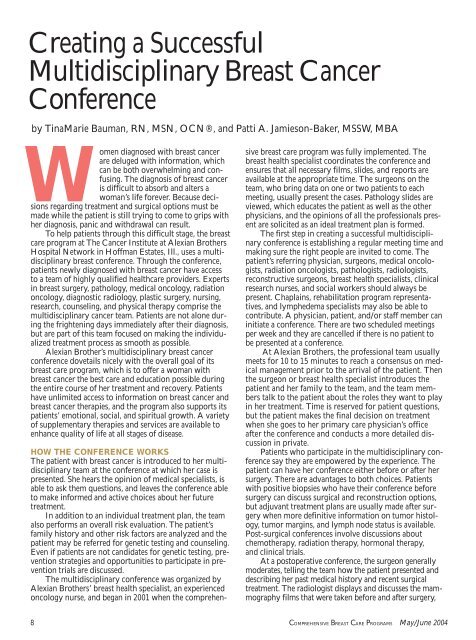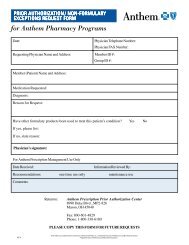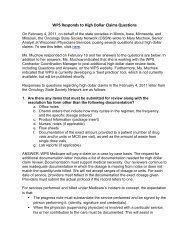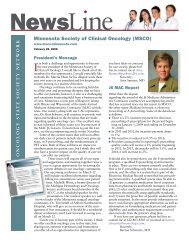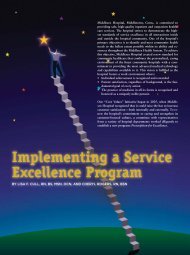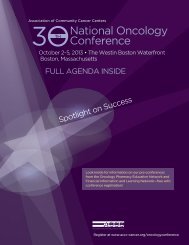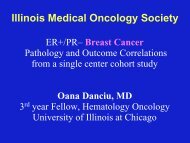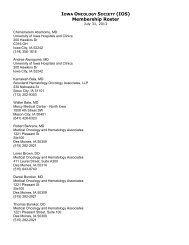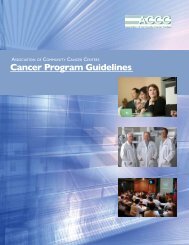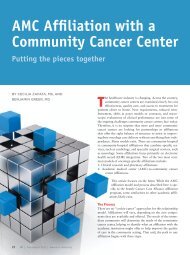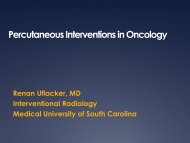Creating a Successful Multidisciplinary Breast Cancer Conference
Creating a Successful Multidisciplinary Breast Cancer Conference
Creating a Successful Multidisciplinary Breast Cancer Conference
You also want an ePaper? Increase the reach of your titles
YUMPU automatically turns print PDFs into web optimized ePapers that Google loves.
<strong>Creating</strong> a <strong>Successful</strong><strong>Multidisciplinary</strong> <strong>Breast</strong> <strong>Cancer</strong><strong>Conference</strong>by TinaMarie Bauman, RN, MSN, OCN®, and Patti A. Jamieson-Baker, MSSW, MBAWomen diagnosed with breast cancerare deluged with information, whichcan be both overwhelming and confusing.The diagnosis of breast canceris difficult to absorb and alters awoman’s life forever. Because decisionsregarding treatment and surgical options must bemade while the patient is still trying to come to grips withher diagnosis, panic and withdrawal can result.To help patients through this difficult stage, the breastcare program at The <strong>Cancer</strong> Institute at Alexian BrothersHospital Network in Hoffman Estates, Ill., uses a multidisciplinarybreast conference. Through the conference,patients newly diagnosed with breast cancer have accessto a team of highly qualified healthcare providers. Expertsin breast surgery, pathology, medical oncology, radiationoncology, diagnostic radiology, plastic surgery, nursing,research, counseling, and physical therapy comprise themultidisciplinary cancer team. Patients are not alone duringthe frightening days immediately after their diagnosis,but are part of this team focused on making the individualizedtreatment process as smooth as possible.Alexian Brother’s multidisciplinary breast cancerconference dovetails nicely with the overall goal of itsbreast care program, which is to offer a woman withbreast cancer the best care and education possible duringthe entire course of her treatment and recovery. Patientshave unlimited access to information on breast cancer andbreast cancer therapies, and the program also supports itspatients’ emotional, social, and spiritual growth. A varietyof supplementary therapies and services are available toenhance quality of life at all stages of disease.HOW THE CONFERENCE WORKSThe patient with breast cancer is introduced to her multidisciplinaryteam at the conference at which her case ispresented. She hears the opinion of medical specialists, isable to ask them questions, and leaves the conference ableto make informed and active choices about her futuretreatment.In addition to an individual treatment plan, the teamalso performs an overall risk evaluation. The patient’sfamily history and other risk factors are analyzed and thepatient may be referred for genetic testing and counseling.Even if patients are not candidates for genetic testing, preventionstrategies and opportunities to participate in preventiontrials are discussed.The multidisciplinary conference was organized byAlexian Brothers’ breast health specialist, an experiencedoncology nurse, and began in 2001 when the comprehensivebreast care program was fully implemented. Thebreast health specialist coordinates the conference andensures that all necessary films, slides, and reports areavailable at the appropriate time. The surgeons on theteam, who bring data on one or two patients to eachmeeting, usually present the cases. Pathology slides areviewed, which educates the patient as well as the otherphysicians, and the opinions of all the professionals presentare solicited as an ideal treatment plan is formed.The first step in creating a successful multidisciplinaryconference is establishing a regular meeting time andmaking sure the right people are invited to come. Thepatient’s referring physician, surgeons, medical oncologists,radiation oncologists, pathologists, radiologists,reconstructive surgeons, breast health specialists, clinicalresearch nurses, and social workers should always bepresent. Chaplains, rehabilitation program representatives,and lymphedema specialists may also be able tocontribute. A physician, patient, and/or staff member caninitiate a conference. There are two scheduled meetingsper week and they are cancelled if there is no patient tobe presented at a conference.At Alexian Brothers, the professional team usuallymeets for 10 to 15 minutes to reach a consensus on medicalmanagement prior to the arrival of the patient. Thenthe surgeon or breast health specialist introduces thepatient and her family to the team, and the team memberstalk to the patient about the roles they want to playin her treatment. Time is reserved for patient questions,but the patient makes the final decision on treatmentwhen she goes to her primary care physician’s officeafter the conference and conducts a more detailed discussionin private.Patients who participate in the multidisciplinary conferencesay they are empowered by the experience. Thepatient can have her conference either before or after hersurgery. There are advantages to both choices. Patientswith positive biopsies who have their conference beforesurgery can discuss surgical and reconstruction options,but adjuvant treatment plans are usually made after surgerywhen more definitive information on tumor histology,tumor margins, and lymph node status is available.Post-surgical conferences involve discussions aboutchemotherapy, radiation therapy, hormonal therapy,and clinical trials.At a postoperative conference, the surgeon generallymoderates, telling the team how the patient presented anddescribing her past medical history and recent surgicaltreatment. The radiologist displays and discusses the mammographyfilms that were taken before and after surgery,8 COMPREHENSIVE BREAST CARE PROGRAMS May/June 2004
and the pathologist presents and interprets the tissue slides.Technical information, such as tumor characteristics,surgical margins, and other prognostic factors are explainedto the patient so she can make the most informed choicespossible. Having the patient be an active listener while asupport person (often a family member or friend) takescopious notes has been found to work the best. Taperecording is not permitted unless prior approval has beenreceived from all the physicians present.The breast health specialist dictates the report on themultidisciplinary conference and sends the report to thepatient, all the specialists who were present, and thehealthcare providers who will be treating the patient inthe future.The breast health specialist also serves as the patient’sreference person and care coordinator after the conference.The specialist’s job is to make sure that any tests thatwere ordered during the conference are set up and carriedout, and to answer any questions the patient has about theinformation presented at the conference. The specialistalso gives the patient a business card in case she or herfamily members have questions in the future.The success of our multidisciplinary conference isprimarily due to the cooperation and support of the hospital’sphysicians, professional staff, administration, andbreast center task force. Patients leave the conferencewith an enormous amount of valuable information abouttheir diagnosis and treatment plan. Perhaps even moreimportantly, the patients report feeling less stress, lessanxiety, and less turmoil and a high degree of satisfactionabout their care. O ITinaMarie Bauman, RN, MSN, OCN®, is breast centercoordinator and genetic nurse clinician, The <strong>Cancer</strong>Institute at Alexian Brothers Hospital Network inHoffman Estates, Ill. Patti A. Jamieson-Baker, MSSW,MBA, is executive director, oncology services at The<strong>Cancer</strong> Institute.MULTIDISCIPLINARY PHYSICIAN CONFERENCES ENHANCE PATIENT CAREby Ron Deisher, MPAHAuthor’s note: When this article was written in early2003, the following information was accurate. Sincethen, Health Midwest has been purchased by HCA andThe <strong>Cancer</strong> Institute has become a program of the St.Luke’s Health System. The coordinated, multidisciplinarybreast care conferences and breast centers continue.The <strong>Cancer</strong> Institute in Kansas City, Mo., anintegral part of Health Midwest and St.Luke’s/Shawnee Mission Health System, operatesspecialty care units on several campuses throughoutthe Kansas City metropolitan area. More than5,100 new cancer cases are diagnosed and treated withinour system each year, including more than 900breast cancers. The number of breast cancers diagnosedhas more than doubled since we opened our twobreast health centers with their screening mammographyprograms. The <strong>Breast</strong> Center of Johnson Countyat the Nall campus in suburban Overland, Kans., andthe Center for <strong>Breast</strong> Care at the Wornall campus inKansas City, Mo., have significantly improved the waywe are able to care for the women of our community.Weekly prospective multidisciplinary conferencesto formulate treatment plans for newly diagnosedbreast cancer patients predate the centers and were oneof the earliest and most important services offered inthe breast centers.All the physician specialists involved in the diagnosisand care of breast cancer patients, nurses, andother healthcare professionals attend the conferences.The meetings are coordinated by our oncology nursespecialists, who also act as patient advocates and helpwomen with breast cancer navigate through our systemof cancer care. In concert with the cancer registrarsand the patient’s physicians, the nurse secures thenecessary records and diagnostic information for agood comprehensive patient-care review conference.The presenting physician is usually a surgeon, butmost physicians attending the conferences participatein the group discussion and offer specialty observationsand recommendations to produce the most accurateand best treatment plan possible.The breast care conferences united our physiciansand encouraged the commitment and involvement necessaryto establish the breast centers. Physicians havesupported the meetings from the beginning, citingtheir educational and patient-care benefits and thevalue of sharing information and expertise with colleagues.We also found that the conferences were evenmore eagerly attended when we dedicated part of onemeeting per month to either presenting new innovationsin breast cancer care or a review of current diagnosticand treatment regimens.The conferences have been such an asset to ourbreast cancer programs that we recently started a similargroup to review the care of newly diagnosed lungcancer patients.Amie Jew, MD, one of the breast surgeonsinvolved in the start up of these conferences, said shebelieves the multidisciplinary conferences truly elevatethe level of care the breast centers can provide. “As thetreatment for breast cancer patients becomes morecomplex, it takes a multidisciplinary team, an orchestratedapproach, and comprehensive programs toachieve the best outcomes for our patients. The journeybecomes rewarding when all physicians can cometogether to inspire each other and collaborate for thebenefit of our patients.” O IRon Deisher, MPAH, is the former administrativedirector of the Division of <strong>Cancer</strong> Control andCommunity Outreach at The <strong>Cancer</strong> Institute inKansas City, Mo. He now lives in Port Ludlow, Wash.,and does volunteer and consulting work for non-profitorganizations.COMPREHENSIVE BREAST CARE PROGRAMS May/June 2004 9


